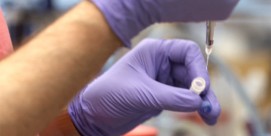In This Episode << SLIDE LEFT TO SEE ADDITIONAL SEGMENTS
David Beckmann Extended Interview
Read more of the Religion & Ethics NewsWeekly interview about foreign aid with Rev. David Beckmann, president of Bread for the World:
There’s been dramatic progress against hunger, poverty, and disease in the world. In 1970, probably about one-third of the people in developing countries were hungry, undernourished. That’s now down to about one-fifth. The big story, I think, is the religious story. I think God is moving in our time to reduce hunger, poverty, and disease, and part of that story is assistance from the rich countries.
Every day about 25,000 kids die needlessly in developing countries. But in 1970 that was about 55,000 kids a day. There has been a dramatic reduction in death among babies and small children, and that was largely driven by assistance. Back in the 1980s, UNICEF had the idea of just teaching poor parents simple things that they could do to keep their kids from dying, things like there’s a simple solution of sugar and salt you can use to keep kids from dehydrating when they have diarrhea. The US government got behind that, US advocacy groups like Bread for the World pushed it, so we got US government money, so all over the world we’ve got poor parents know how to keep their kids from dying. It’s a permanent change in how the world works.
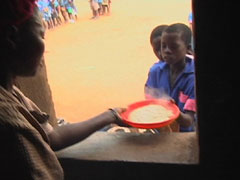 Most of the progress made against hunger, poverty, and disease has been made by people in poor countries working hard to make their countries better, and then it’s poor people working really hard to make life better for themselves and their kids. Aid from the US is a factor. Most of the change, and it’s been a wonderful change, has been done by people in the poor countries. When aid is really focused on reducing poverty or promoting development, I think it has a pretty good record of success. I think the main problem of aid has been our mixed motives. Lots of times we think the same dollar is going to buy an air force base and help poor people over there and help the University of North Carolina. We go with mixed motives, and when you do that, it is poor people in remote areas in poor countries that don’t get very well served. Right now we are putting a lot of development money to aid in Afghanistan, but the primary motive is not to help people in Afghanistan get out of poverty. If we want to help people get out of poverty, there are a lot of other places where the circumstances are better, where poor countries are making progress. At the end of the day in Afghanistan, the purpose of that money is not to help poor people. The primary reason is to fight terrorism.
Most of the progress made against hunger, poverty, and disease has been made by people in poor countries working hard to make their countries better, and then it’s poor people working really hard to make life better for themselves and their kids. Aid from the US is a factor. Most of the change, and it’s been a wonderful change, has been done by people in the poor countries. When aid is really focused on reducing poverty or promoting development, I think it has a pretty good record of success. I think the main problem of aid has been our mixed motives. Lots of times we think the same dollar is going to buy an air force base and help poor people over there and help the University of North Carolina. We go with mixed motives, and when you do that, it is poor people in remote areas in poor countries that don’t get very well served. Right now we are putting a lot of development money to aid in Afghanistan, but the primary motive is not to help people in Afghanistan get out of poverty. If we want to help people get out of poverty, there are a lot of other places where the circumstances are better, where poor countries are making progress. At the end of the day in Afghanistan, the purpose of that money is not to help poor people. The primary reason is to fight terrorism.
There are places like Afghanistan and Iraq where we are trying to win the hearts and minds of the people during the war, but the war is going on, and you can’t get civilians into those zones. So in those kinds of situations it makes sense for the military to give money for schools. But, frankly, I don’t think it’s going to do a whole lot for the long-term development of those countries until they get to a situation of peace. Where it doesn’t make sense for the military to get involved is troops going down to Central America and inoculating kids. [Defense] Secretary Gates has been very clear about this. He wants strong civilian agencies to be able to carry out our development assistance programs so that our military can focus on what they do. They don’t do a good job reducing poverty, and it’s a mistake to let as much of our money to be helping poor people to go through our military. It also keeps them from them doing their job well.
People like me who want more money to help reduce poverty in the world ought to be also doing our part to insist that the systems work well. They don’t work as well as they should. I think we need a stronger development agency, some voice in the US government, a strong voice that can speak up for poverty reduction, global development, and carry that out in an effective way. We don’t have that right now. There is a lack of coordination. When I was in Mozambique, there are three big US development agencies in the same building doing different things—the AIDS program, the ag[riculture] program, and they don’t even talk to each other very well. For various reasons, we over-earmark our aid so that when our people get to Mozambique they can’t be responsive to the local situation or what local people there are trying to do. They’ve already got their marching orders from Congress or the president or somebody, so we can’t be responsive to what local people are trying to do.
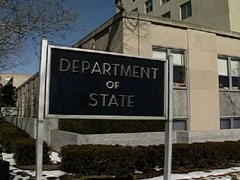 There are three big agencies that administer US development assistance. There are 60 offices of government that have foreign assistance programs. It’s a nutsy thing. There wasn’t much political commitment to development assistance. Our main agency, the US Agency for Development, was allowed to deteriorate. Then President Bush could see that reducing poverty was important to our security. He started an AIDS program. He started a new corporation as a channel for assistance, so we’ve come to the point where we just have a clutter of US agencies trying to do the job. These are good people. They try to do the job well, but it’s clear that we need one strong agency responsible for development, related to the State Department, and then we also need better coordination across the 60 offices of government. We need a strong development agency, better coordination, and we need to be better responsive to local needs and local people.
There are three big agencies that administer US development assistance. There are 60 offices of government that have foreign assistance programs. It’s a nutsy thing. There wasn’t much political commitment to development assistance. Our main agency, the US Agency for Development, was allowed to deteriorate. Then President Bush could see that reducing poverty was important to our security. He started an AIDS program. He started a new corporation as a channel for assistance, so we’ve come to the point where we just have a clutter of US agencies trying to do the job. These are good people. They try to do the job well, but it’s clear that we need one strong agency responsible for development, related to the State Department, and then we also need better coordination across the 60 offices of government. We need a strong development agency, better coordination, and we need to be better responsive to local needs and local people.
I think our foreign assistance is broken. It does some good, it does a lot of good, but we can get a lot more impact out of those tax dollars. It’s not just the aid; it’s the coordination of aid with trade and diplomatic policies. For example, in Bangladesh—we charge Bangladesh more in tariffs for the things they import into the US then we give them in aid, so we are taking with one hand what we give with the other.
One of the clearest lessons of 40 years of development aid is that you got to start by listening. You’ve got to start by asking people in the situation how do they see the problem, and what are they trying to do to get out of the problem? And chronically people come from far-off places, smart, well-educated people with bright ideas, and try to plant those ideas in very poor places, and they go back home. It’s the local people who know what will work and won’t work.
Congress tends to have its ideas. Individual members of Congress get their licks in. The administration has some things they want to do, various outside groups that lobby Congress more money for this, more money for that, so we end up with aid program where every dollar is earmarked twice. So you get to Uganda, and you want to do something with the Ugandans: We’ve got this problem here we want to solve. We don’t have money for that; it’s not on our checklist of 500 things that we can do.
We are excessively concerned about corruption. Corruption is a problem, and we have to be serious about it, but it’s a little bit less of a problem than it used to be because of cell phones and information technology. Most developing countries are democracies. People can speak up if money is spent on a bridge, and there is no bridge.
I visited a country US AIDS program. If you are going to get those medications out into rural areas, you have to use the ministry of health, and the official said we have US contractors embedded in their department of health, so instead of giving money to an African agency we want to build up and make stronger we give it to US contractors because we don’t really trust those Africans. If we can’t help them build up systems to help reduce corruption in their own organizations we are not going to have success. I think our food aid program is a good example where some reform is possible. Every dollar that we appropriate for food aid, more than 50 cents goes to transportation and administration. With the high price of oil now, to ship food from Iowa or Kansas to Ethiopia is a very expensive proposition. The best way often to get food in a place where you need food aid, a refugee camp, is to find food locally or in a nearby country. Buy the food from farmers there. But we end up shipping it almost all the time; we ship food produced here. I don’t think it makes much difference to US farmers anymore. It’s partly because there is a small group of shipping companies that they are US-flagged shipping companies, and the law says they get to ship that food. They aren’t efficient shipping companies, but they are very well positioned to lobby Congress, and they push that all that money that is supposed to help the poorest people in the world should go to food that they are going to ship. It’s a scandal. If they were just taking 20 percent I could live with it, but now it’s gone to more than 50 percent of the cost of food aid. Bread for the World is campaigning to get that system changed.
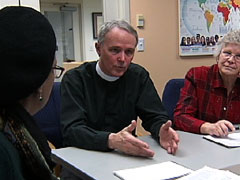 Rev. David Beckmann |
Bread for the World has worked on trade policies toward Africa, toward Haiti to try open up opportunities for poor countries to export into the US. It’s good business for the US. Usually trade and investment tends to benefit better off people first. So if you really are trying to lift the least of these you often need some aid money to complement it. Really poor countries have in fact managed to achieve really rapid economic growth, partly through aid, partly through trade opportunities. In fact, places like India, China, Korea, Indonesia—these are places I want to put some of my 401(k) money.
The Bush administration started talking about 3 D’s, and the Obama administration has picked that up. The D’s are defense, diplomacy and development. Those are the three legs of our foreign policy. But the defense leg is real long, the diplomacy leg is kind of stubby, and the development leg is tiny, tiny. Both President Bush and President Obama were clear that development, helping people around the world make a better life for themselves—it’s the right thing to do but also in the long-term contributes to our diplomacy and our defense.
As a nation we are really great at responding to emergencies especially when they are on TV, and when the camera and lights go off we are not great. But Haiti is going to be very poor for 30 years, and so our efforts to support the Haitians in making a better life for themselves have to be steady. This has to be a long-term commitment. Two-thirds of Haiti’s exports are textiles, mainly t-shirts, so trade is a proven instrument there. But they can also produce rice. We’ve killed their rice industry. They had rice production. The IMF made them quit subsidizing their rice and open up their borders. The US rice production is heavily subsidized, so now you can go to Haiti, on this side of the road there is a field that used to be a rice field that is now barren. On this side of the road there is a little shack, they are selling US rice. Haiti could be a sugar producer, but our sugar is heavily protected, subsidized, tariffs, all kinds of protection. One thing we could do with Haiti is open up to trade. I also think, I know this is controversial, I think we have to open up to immigration. Our country and the rest of surrounding countries, we could absorb some people, and there are Haitians in this country who could bring their people into the country.
The amount of money that we are spending on programs helping to reduce poverty in developing countries has tripled between 2000 and 2010. The experience of 9/11 made us aware that we are interconnected with the world, and it’s not smart to neglect misery in far-off places. And then we had help from Bono and Brad Pitt. In fact, I’m very encouraged that the country is more committed to reducing poverty now, and if you talk to voters they want to do more. We have changed US politics for the better on this issue, and I expect further change for the better.
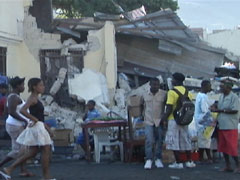 Not always, but often the US government has mixed motives in giving aid. Typically our primary motive is something that is going to help us. We want that country to let us have access to a military base or something like that. But then often we want to make sure that money is spent in the US on some industry that has access to Congress, and also we really do want to help those poor people. But when you are trying to do three things with the same dollar who loses? It’s always the poor people, and that often happens. When we were able to get programs that were really focused on reducing AIDS, reducing child deaths, we’ve had a lot of success. This dramatic progress that was made against hunger, poverty, and disease, to me it’s theological. This is God moving in our history. It makes the Exodus, what happened at the Red Sea, look like small potatoes. Right now we are in a recession. It’s kind of a setback, but if you take a longer view it’s clear that hundreds of millions of people are escaping from abject poverty. I think this is an experience of the good God in our own history, and I thank God we can be part of it.
Not always, but often the US government has mixed motives in giving aid. Typically our primary motive is something that is going to help us. We want that country to let us have access to a military base or something like that. But then often we want to make sure that money is spent in the US on some industry that has access to Congress, and also we really do want to help those poor people. But when you are trying to do three things with the same dollar who loses? It’s always the poor people, and that often happens. When we were able to get programs that were really focused on reducing AIDS, reducing child deaths, we’ve had a lot of success. This dramatic progress that was made against hunger, poverty, and disease, to me it’s theological. This is God moving in our history. It makes the Exodus, what happened at the Red Sea, look like small potatoes. Right now we are in a recession. It’s kind of a setback, but if you take a longer view it’s clear that hundreds of millions of people are escaping from abject poverty. I think this is an experience of the good God in our own history, and I thank God we can be part of it.
Haitians need to solve the Haitian problem. Haiti is a complicated case, but it’s complicated partly because of a long history of foreign exploitation. Virtually all these people were brought over and served as slaves. A big slave rebellion in 1804, they became an independent country, and for 100 years a pariah nation. The US and Germany and France wouldn’t deal with them except to send in warships and extract debt payments. Even in the 20th century, our government and other rich parts of the world have repeatedly exploited Haiti, so there’s internal corruption, internal weaknesses, but there is also this long history of external exploitation. If that all is going to be healed, yes, we need aid coordination. Some agency is going to be set up to make sure we won’t trip over each other. That could be a good thing. But Haitians need to be in charge. Haitians need to be deciding their own destiny. They are going to have to solve the problem, or it won’t be solved.
I’m just weary that we focus on Haiti and Afghanistan, the two most difficult cases. If we don’t succeed in those countries—I hope we do—but if we don’t, I wouldn’t be surprised that we won’t see progress against poverty in the short-term. But there are still scores of other places in the world, very poor places, where the misery is just as severe, and people are moving forward and could use some help. Partly what I want is to use more of our assistance in places where you have a lot of poor people and some real chance to help them get out of it.






